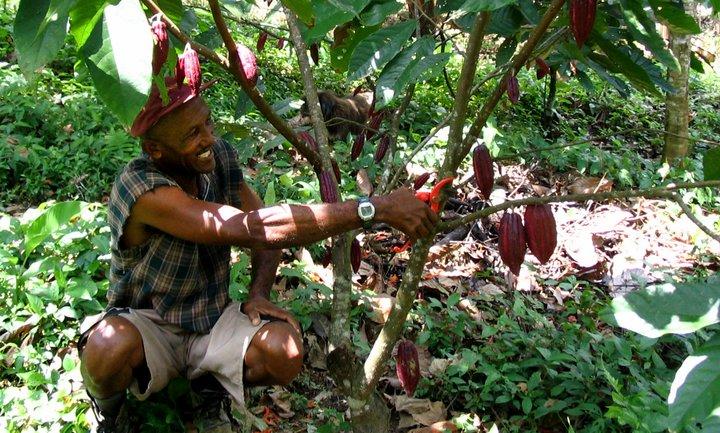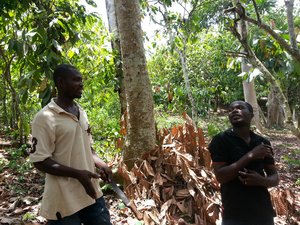Certified cocoa in West Africa: Taking stock and key issues for moving ahead

Dietmar Stoian, Principal Scientist, Value Chains and Private Sector Engagement co-presented research being carried out in partnership with the World Agroforestry Centre and Fairtrade Africa on ways to assess the impact of Fairtrade on cocoa growers and cooperatives in Ghana and Côte d'Ivoire at a webinar hosted by the ISEAl Alliance earlier this week.
The global chocolate industry largely relies on 5 to 6 million smallholder farmers who supply around 90% of the total volume produced across tropical Africa, Asia and Latin America. The industry faces positive prospects in view of growing global demand, particularly in India, China and other countries in the Asia-Pacific region.
At the same time, the industry needs to address persistent problems in cocoa producing countries, such as widespread poverty among smallholders, poor rural infrastructure, low productivity, and weak organizational and management capacities of cocoa cooperatives.
Some of the industry's biggest players have expressed their commitment to address these problems, and to achieve a sustainable cocoa sector by the year 2020. This is where voluntary standard systems can play an important role as they provide independent third-party evidence of progress towards sustainability.
 Fairtrade, for example, offers a framework for producers and buyers to engage in more equitable business relations, with reduced risks for farmers and opportunities for cooperative and community development through investments enabled by the Fairtrade Premium.
Fairtrade, for example, offers a framework for producers and buyers to engage in more equitable business relations, with reduced risks for farmers and opportunities for cooperative and community development through investments enabled by the Fairtrade Premium.
But what does this mean in practice and how can it help countries like Côte D'Ivoire and Ghana, the world’s largest producers of cocoa, to move towards the goal of achieving sustainable production? And as Fairtrade certification expands in West Africa, do cocoa farmers and cooperatives have the capacity to benefit from them?
Exploring these types of questions was the theme of a webinar held on October 6th entitled Fairtrade certified cocoa in West Africa: Taking stock and key issues for moving ahead. The webinar offered insights into these questions by exploring the overall context in which Fairtrade certification operates in Ghana and Côte d’Ivoire, as well as the capacities of recently established Fairtrade-certified cocoa cooperatives and their members.
Dietmar Stoian, Principal Scientist, Value Chains and Private Sector Engagement, Bioversity International, co-presented research being carried out in partnership with the World Agroforestry Centre and Fairtrade Africa on ways to assess the impact of Fairtrade on cocoa growers and cooperatives in Ghana and Côte d'Ivoire. The research shows that Fairtrade can make important contributions to improve conditions for farmers and cooperatives, and there is a real opportunity to make impact at scale, if Fairtrade actively engages with providers of technical, business and financial services to ensure an integrated service offer in line with the needs of cocoa growers and their cooperatives.
The webinar was hosted through the ISEAL Alliance, whose mission is to strengthen sustainability standards for the benefit of people and the environment.
Further links:
Download the presentation: Fairtrade certified cocoa in West Africa: Taking stock and key issues for moving ahead
Download 'Fairtrade Cocoa in Ghana: Taking Stock and Looking Ahead': - an article published in SweetVision
Find out more about Bioversity International’s work on Cocoa
This research is part of the CGIAR Research Programs on Forests, Trees and Agroforestry and Policies, Institutions and Markets and is supported by CGIAR Fund Donors.
Photos:
Top: Farmer in Ghana prunes his cacao tree. Credit: Bioversity International/R. Markham
Bottom: Cocoa farmers in Ghana discussing cacao management. Credit: Bioversity International/D. Stoian
